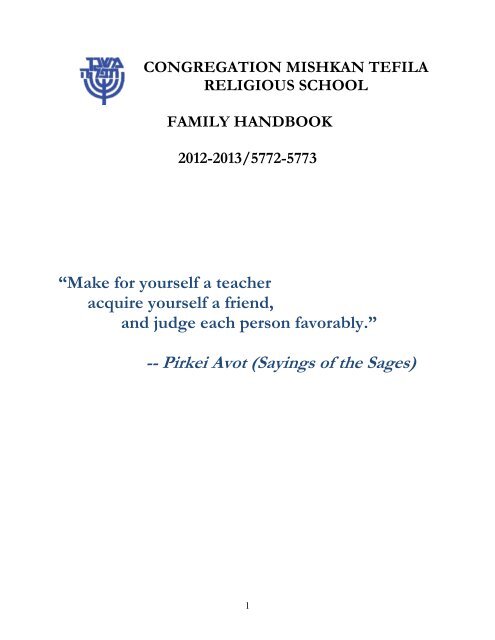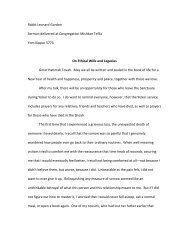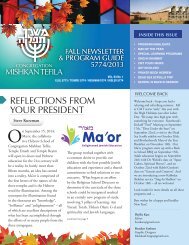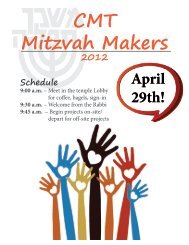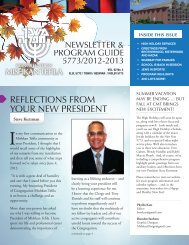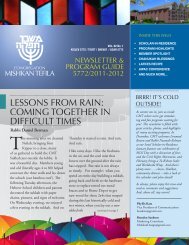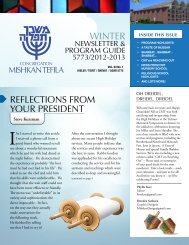-- Pirkei Avot (Sayings of the Sages) - Congregation Mishkan Tefila
-- Pirkei Avot (Sayings of the Sages) - Congregation Mishkan Tefila
-- Pirkei Avot (Sayings of the Sages) - Congregation Mishkan Tefila
- No tags were found...
You also want an ePaper? Increase the reach of your titles
YUMPU automatically turns print PDFs into web optimized ePapers that Google loves.
CONGREGATION MISHKAN TEFILARELIGIOUS SCHOOLFAMILY HANDBOOK2012-2013/5772-5773“Make for yourself a teacheracquire yourself a friend,and judge each person favorably.”-- <strong>Pirkei</strong> <strong>Avot</strong> (<strong>Sayings</strong> <strong>of</strong> <strong>the</strong> <strong>Sages</strong>)1
Dear Families,Providing our children with a strong Jewish education shaped by Jewish values is sacred work. Weare grateful for this opportunity to help your children feel pride in <strong>the</strong>ir Jewish identity and reach<strong>the</strong>ir highest potential as learners and people.Our educational philosophy is straightforward: we seek to engage students “l’fi da’ato” – according toeach student’s ability to receive, to understand, and to respond with anticipation and energy. We dothis through compelling, creative, and diverse educational programming. Learning is fun, meaningfuland stress free. Students look forward to class and graduates leave as knowledgeable, committedmembers <strong>of</strong> <strong>the</strong> Jewish community. Your children will feel at home here. We give <strong>the</strong>m <strong>the</strong> gift <strong>of</strong>growing up with an understanding <strong>of</strong> <strong>the</strong>ir Jewish identity and <strong>the</strong> realization that <strong>the</strong>y are connectedto something larger than <strong>the</strong>mselves, deeply rooted in history. All families who are committed toraising Jewish children are welcome at our school.Our curriculum is based on <strong>the</strong> most important concepts <strong>of</strong> Judaism: Torah, tefilah (prayer), andgemilut hasadim (social justice, mitzvot, ethics, and acts <strong>of</strong> kindness). Our students deepen <strong>the</strong>irunderstanding <strong>of</strong> Shabbat and holidays, Jewish history and Israel, ethics and values, Torah andprayer and are engaged in study <strong>of</strong> Ivrit (Hebrew).We welcome you to join us for <strong>the</strong> many opportunities over <strong>the</strong> course <strong>of</strong> <strong>the</strong> year for children andfamilies to celebrate Shabbat and holidays, to sing, to learn, and to share meals toge<strong>the</strong>r, includingwhat will be our third Annual CMT Family Shabbaton at Camp Ramah.This handbook is designed to provide an introduction to our programs and academic curriculum, aswell as expectations and requirements <strong>of</strong> students, parents and guardians. It contains importantinformation and we hope it communicates <strong>the</strong> values, care, and passion we strive to bring to <strong>the</strong>school every day. We look forward to this year toge<strong>the</strong>r and wish you a year <strong>of</strong> health andhappiness.All <strong>the</strong> best,Erin Gubert2
STAFFSenior Rabbi Leonard GordonRabbi Gordon spent 16 years as a congregational rabbi at <strong>the</strong> Germantown Jewish Center inPhiladelphia. He has taught Jewish Studies and Humanities at Kenyon College and Ohio StateUniversity, and Rabbinic Literature at <strong>the</strong> Jewish Theological Seminary, The ReconstructionistRabbinical College and Hebrew College. He is married to Dr. Lori Lefkovitz, Ruderman Pr<strong>of</strong>essor<strong>of</strong> Jewish Studies at Nor<strong>the</strong>astern University and has two daughters, Ronya and Samara. He willshare in <strong>the</strong> teaching <strong>of</strong> our Makor students and visit each <strong>of</strong> our classrooms throughout <strong>the</strong> year.Rabbi Gordon looks forward to spending time with our families and children.EMAIL: rabbi@mishkantefila.orgErin GubertReligious School DirectorA much-loved and respected religious school teacher, Erin Gubert will be stepping up to becomeour new Religious School Director. Previously, Erin has held Pre-K, Religious School, and Junior<strong>Congregation</strong> teaching positions at <strong>Mishkan</strong>. She has also worked as <strong>the</strong> Head Teacher at GanShelanu Preschool at Solomon Schechter <strong>of</strong> Greater Boston, and as a Junior <strong>Congregation</strong> Teacherat <strong>Congregation</strong> B’nai Jeshurun in Staten Island. Erin received her B.A. from Brandeis University,holds a certificate in Jewish Education for Early Childhood from Hebrew College, and is currentlyworking toward an M.A. in Jewish Education. She prides herself on creative Torah learning, whichshe brings lovingly into her classes. She has three children: Daniel, Tristan and Mariana, all <strong>of</strong> whomhave attended CMT’s Religious School and Prozdor.EMAIL: erin.mishkantefila@gmail.comRabbi Marcia PlumbAssociate RabbiRabbi Plumb was <strong>the</strong> Rabbi for London’s Akiva School and <strong>the</strong> Southgate and District ReformSynagogue. For 15 years, she was <strong>the</strong> Director <strong>of</strong> Spiritual Formation at Leo Baeck, <strong>the</strong> rabbinicseminary in London. She has also served as <strong>the</strong> Rabbi at <strong>the</strong> North London Progressive Synagogue,and Deep River, Connecticut’s <strong>Congregation</strong> Beth Shalom. Hoping to lead o<strong>the</strong>rs on a path towardsspiritual enlightenment, she founded Neshama: For Spiritual Wellbeing, a center for spiritualreflection, meditation and <strong>the</strong> study <strong>of</strong> Mussar literature. Plumb was ordained a Rabbi at <strong>the</strong>Hebrew Union College-Jewish Institute <strong>of</strong> Religion, New York. She holds a Masters in HebrewLiterature from Hebrew Union College-Jewish Institute <strong>of</strong> Religion, Los Angeles and a B.A. inPsychology from <strong>the</strong> University <strong>of</strong> Texas.Wendy HandlerDirector <strong>of</strong> Youth and Family Programs3
A longtime member <strong>of</strong> <strong>Mishkan</strong>, Wendy has made a career out <strong>of</strong> touching lives, both within ourcongregation, and elsewhere. She has served on <strong>the</strong> <strong>Mishkan</strong> staff as Me’ah Coordinator, FamilyEducator, and Youth Director and has volunteered for our Family Table and Youth Department.Before her <strong>Mishkan</strong> days, Wendy was heavily involved in Jewish academic outreach, directingstudent activities at <strong>the</strong> Boston University Hillel. Wendy earned both a Bachelors and Masters <strong>of</strong>Law from York University in Toronto. She <strong>the</strong>n went onto receive a second Masters in JewishCommunal Service at Brandeis University and her Certificate in Jewish Family Education fromHebrew College.Dr. Davin WolokRitual Director and Chazan SheiniDr. Wolok teaches Torah and Haftarah trope to our Makor students and tutors our Bnei Mitzvahstudents as <strong>the</strong>y prepare to read Torah, chant haftarah and share words <strong>of</strong> Torah and blessing with<strong>the</strong> community. His warmth, patience and good humor is appreciated by everyone who has <strong>the</strong>pleasure <strong>of</strong> spending time with him.EMAIL: ritualdirector@mishkantefila.orgJudy SzathmaryGan/Kita Bet- 1 st gradeJudy has been a beloved teacher at <strong>Mishkan</strong> <strong>Tefila</strong>’s Hebrew School for decades. She loves teachingour first graders to read Hebrew, learn about Jewish holidays, find meaning in Shabbat and explore<strong>the</strong>ir early Jewish identity. She is an experienced Jewish educator and looks forward to helping thisyear’s incoming class open <strong>the</strong>ir hearts and minds to <strong>the</strong> richness and wonders <strong>of</strong> our tradition.Erin Gubert (Religious School Director)Kita Bet– 2 nd gradeSharon WanunuKita Gimmel/Kita Daled – 3 rd /4 th gradeSharon Wanunu has traveled <strong>the</strong> world and is thrilled that destiny has brought her back to Boston.She has two girls, Maya and Emma and is <strong>the</strong> proud wife <strong>of</strong> her pr<strong>of</strong>essor-husband, Dr. MeniWanunu. She is a teacher, writer and avid learner. In her free time, you can find her in <strong>the</strong> kitchencreating fabulous allergy-friendly dishes for her family and friends. Sharon can't wait to exploreJewish learning with her new students this year at <strong>Mishkan</strong> <strong>Tefila</strong>.Rachel PutterhamKita Hey-5 th GradeA former attorney who practiced public interest law for eighteen years, Rachel will be joining us thisfall as a 5 th grade Hebrew teacher. Rachel earned her B.A. in Political Science from <strong>the</strong> University <strong>of</strong>California, San Diego and her J.D. from Washington College <strong>of</strong> Law, American University. We aredelighted to welcome her to our team.4
Cindy Yan<strong>of</strong>skyMakorVeteran teacher Cindy Yan<strong>of</strong>sky will be returning to <strong>Mishkan</strong> <strong>Tefila</strong> this fall to teach in our Makorprogram. She will also be leading our students on <strong>the</strong>ir annual visit to <strong>the</strong> United States HolocaustMemorial Museum in <strong>the</strong> spring. Cindy earned her B.A. in Biomedical Ethics from BrownUniversity; her J.D from Boston College School <strong>of</strong> Law; and her M.A.T. in Elementary Educationfrom Brandeis University, where she received a certificate in Jewish Day Schools. Formerly acorporate attorney, Cindy has held various teaching roles, including a preschool and religious schoolposition at <strong>Mishkan</strong> <strong>Tefila</strong>.Our staff will be participating in our ongoing pr<strong>of</strong>essional development curriculum taught by <strong>the</strong><strong>Congregation</strong>al Education Initiative at Hebrew College and tailored specifically for our school andcommunity. We are privileged to benefit from this special program at <strong>the</strong> generosity <strong>of</strong> CombinedJewish Philanthropies, which subsidizes <strong>the</strong> program for three years. Our teachers are excited tocontinue developing <strong>the</strong>ir skills in both Jewish content and pedagogy.CLASS MEETING DAYS AND TIMESOur school year begins Sunday, September 9, 2012. You can find a calendar <strong>of</strong> <strong>the</strong> school year on our websiteat mishkantefila.org.SUNDAYS ONLY 9AM-12PM:K and 1 (Gan and Alef)SUNDAYS 9AM-12PM AND TUESDAYS 3:30-6PM:Grades 2-5 (Bet-Hey)MakorOur 6 th and 7 th graders participate in <strong>the</strong> Makor Program at Hebrew College.Students meet on Sunday morning at Hebrew College from 9:30 am to 1:30 pm. On Tuesdayafternoons, students learn at CMT from 3:30-6:00 pm.5
FAMILY SHABBAT EXPERIENCES: NOURISHING OUR SOULSOur ancient rabbis teach us that lighting candles is <strong>the</strong> first mitzvah <strong>of</strong> Shabbat. Our mysticaltradition <strong>of</strong>fers <strong>the</strong> insight that once we light <strong>the</strong> Sabbath candles, our lives become filled with light.We can fulfill <strong>the</strong> mitzvah <strong>of</strong> preparing for Shabbat through simple acts: food shopping, mealpreparation, learning and discussion at home, and reading books to our children. And whenShabbat is upon us, we can fulfill <strong>the</strong> mitzvah <strong>of</strong> its observance by filling our homes with <strong>the</strong> light <strong>of</strong><strong>the</strong> Shabbat candles, making Kiddush over wine or grape juice, saying ha’motzi over challah, and bysinging, learning, teaching, coming into community for prayer, and nourishing our souls with rest.Shamor et yom ha-Shabbat le’kodsho is <strong>the</strong> commandment to observe <strong>the</strong> Sabbath day and make it holy.“All week long we are called upon to sanctify life through employing things <strong>of</strong> space. On <strong>the</strong>Sabbath, it is given us to share in <strong>the</strong> holiness that is in <strong>the</strong> heart <strong>of</strong> time.” Rabbi Abraham JoshuaHeschel, The Sabbath.Throughout this year, we would love for your family to join our community celebrations <strong>of</strong> Shabbat.Children will gain <strong>the</strong> experience <strong>of</strong> learning <strong>the</strong> service, practicing <strong>the</strong>ir Hebrew, and coming intodeeper understanding <strong>of</strong> <strong>the</strong> rich, layered meanings <strong>of</strong> Shabbat, tfilah (prayer) and <strong>the</strong> weekly Torahreading. We hope <strong>the</strong>y will deepen <strong>the</strong>ir sense <strong>of</strong> joy in this shared experience, and developimportant relationships with friends, teachers, and community members, as well as our rabbis andcantors. With regular attendance at Shabbat services, <strong>the</strong> skills, ideas and knowledge that studentslearn as part <strong>of</strong> <strong>the</strong> school’s prayer curriculum will be realized in actual practice.Please check your email and our website for announcements about upcoming Family ShabbatExperiences.EXPECTATIONS OF STUDENTS1. PreparationAll students are expected to arrive at school on time, with homework completed, and withall necessary books and materials to start <strong>the</strong> day.Parents <strong>of</strong> students in grades 3-7, please provide a notebook binder or notebook foryour children to organize <strong>the</strong>ir work. Please be sure that your child comes to school regularlyand prepared to learn.2. HomeworkWe recognize that students, even in earlier grades, begin receiving a lot <strong>of</strong> school homework.Keeping this in mind, we try to accomplish as much as we can in <strong>the</strong> classroom, ready to continue<strong>the</strong> following class. However, we have found that practicing reading Hebrew and review <strong>of</strong>important enduring understandings that students are taught in <strong>the</strong> classroom is invaluable to <strong>the</strong>irunderstanding and integration <strong>of</strong> <strong>the</strong> content. Thus, reading and/or writing homework isoccasionally assigned. Please discuss with your child what he or she learned in class after each6
session. This provides an excellent form <strong>of</strong> review and helps your child more deeply understand <strong>the</strong>material.We are more than happy to work toge<strong>the</strong>r with <strong>the</strong> families <strong>of</strong> students who desireenrichment work to try to provide additional learning opportunities.3. Hebrew ReadingReading Hebrew requires frequent exposure and practice. The fundamentals <strong>of</strong> learningHebrew are taught in Kitot Alef and Bet (1 st and 2 nd grades). Although tutoring will be at <strong>the</strong> family’sexpense, we will work toge<strong>the</strong>r with parents to identify a tutoring or o<strong>the</strong>r language support thatfeels right for your child.4. AttendanceRegular attendance is mandatory for successful and meaningful participation in our program.Students returning from an occasional absence are responsible for work assigned to facilitate acomfortable return to <strong>the</strong> classroom.Excessive absences (15% or more <strong>of</strong> <strong>the</strong> total class sessions) will necessitate a conferencebetween <strong>the</strong> school and family. Assignments or projects may be required in addition to <strong>the</strong> regularhomework assignments. Students absent on a regular basis will require weekly tutoring. Tutorialcosts are <strong>the</strong> responsibility <strong>of</strong> <strong>the</strong> families.5. Derekh Eretz (Respectful Conduct)Our community is guided by <strong>the</strong> principle <strong>of</strong> kavod habriot: <strong>the</strong> deepest form <strong>of</strong> respect forourselves and for o<strong>the</strong>rs. Living out this Jewish value means conducting ourselves mindfully andwith awareness at all times. It enables all members <strong>of</strong> <strong>the</strong> school community to function toge<strong>the</strong>r inan environment <strong>of</strong> mutual respect, trust and appreciation. Derekh eretz teaches us to have respect foro<strong>the</strong>rs, respect for property, respect for tradition and respect for learning. Appropriate conduct inour school includes <strong>the</strong> following:Treating one ano<strong>the</strong>r – and ourselves – with kavod: honor and respect.Attending class with assigned work completed, with all books, pencils and o<strong>the</strong>r materials asneeded.Raising one's hand and waiting to be called upon to respond to teacher's questions and toconstructively contribute to class discussions.Showing respect for o<strong>the</strong>rs by not interrupting teachers, guest speakers or classmates.Entering and leaving <strong>the</strong> classroom on all occasions quietly.Quietly completing individual study tasks as assigned and working co-operatively in smallgroup situations.Using appropriate language.Refraining from antagonizing classmates.7
Clothing should reflect a balance <strong>of</strong> individual expression and kavod for <strong>the</strong> school,classmates, and <strong>the</strong> learning environment. Clothing should be modest, comfortable, neat,and appropriate for <strong>the</strong> wea<strong>the</strong>r.Violations <strong>of</strong> <strong>the</strong>se Rules <strong>of</strong> Conduct will be addressed as follows:oooA first violation requires <strong>the</strong> student, at <strong>the</strong> teacher's instruction, to work quietly onhis or her own for <strong>the</strong> remainder <strong>of</strong> <strong>the</strong> period.A second violation leads to a meeting between <strong>the</strong> student and <strong>the</strong> Director, ErinGubert.A third violation leads to a parental call and meeting, at which time a contract settingterms for continued participation is made among <strong>the</strong> student, teacher, and parents.If a student is not able to participate in <strong>the</strong> classroom without disrupting <strong>the</strong> class on anongoing basis, parents will be responsible for providing an aide in <strong>the</strong> classroom toassist and support <strong>the</strong> child, and parents will meet with <strong>the</strong> Religious School Director todiscuss <strong>the</strong> child’s options for continuing in our program.YOUTH PROGRAMSThis coming year we will continue to develop fun, meaningful programs for youth that areintegrated into <strong>the</strong> life <strong>of</strong> Hebrew school and synagogue community, and are connected to USY andProzdor. Wendy Handler will be helping to develop opportunities for youth to learn, developsustaining relationships, and become involved in social action and social justice opportunities.Please see our website and calendar for more information at www.mishkantefila.orgBAR/BAT MITZVAH PROGRAMStudents in this year’s Bnei Mitzvah class will receive a separate Bar/Bat Mitzvah handbook, andwill be preparing with Dr. Wolok and Rabbi Gordon.It is recommended that pre-Bar/Bat Mitzvah families attend a minimum <strong>of</strong> fifteen (15) Shabbatmorning services prior to <strong>the</strong> date <strong>of</strong> <strong>the</strong> Bar/Bat Mitzvah.Parents are invited and encouraged to provide <strong>the</strong>ir children with a Tallit and Tefilin. This is aspecial opportunity to begin <strong>the</strong> preparation and celebration <strong>of</strong> a Bar or Bat Mitzvah toge<strong>the</strong>r. Any<strong>of</strong> CMT’s clergy will be happy to meet with you to help you make <strong>the</strong> right decisions, and toexplore toge<strong>the</strong>r how this can be a meaningful opportunity to begin marking this special event.PARENT LEADERSHIP AND INVOLVEMENTIn order to make this a successful year <strong>of</strong> Jewish learning and experience for our children, we needparents to help plan and prepare special family events. We will make sure our work toge<strong>the</strong>r hasJewish content and depth, and feels nourishing, including spending time learning toge<strong>the</strong>r.8
Among many o<strong>the</strong>r opportunities for involvement, please let us know if you would help organize Back-to-school community lunch Sukkah decorating with students Sukkot Family Celebration Simchat Torah Family Service Chanukkah Family Celebration Family Shabbat Experiences Tu B’Shvat Seder Purim Carnival Passover Seders Family ShabbatonPARENTAL RESPONSIBILITIES1. Food/SnacksPlease be sure that your children receive a wholesome snack before coming to school.Please also provide a kosher dairy or parve (no meat) snack for your child to eat during break in <strong>the</strong>school day. There are students in our school who have a potentially life-threatening allergy tonuts. Absolutely no nuts or food products containing nuts are ever to be brought into <strong>the</strong>building. When class celebrations take place, only certified kosher dairy or parve products arepermitted.2. Notices to ParentsThere will be occasional information handed out to students in class. Most information,however, will be sent to parents by email. Please keep <strong>the</strong> school and synagogue informed <strong>of</strong> anyupdates in addresses, email or phone numbers, and please let us know if email is not a convenientway to reach you and sign up for our Constant Contact. Please refer to emails and <strong>the</strong> schoolcalendar at www.mishkantefila.org frequently so that you may be informed <strong>of</strong> upcoming programs,schedule changes and community events.3. MessagesIn <strong>the</strong> event that a message has to be relayed to a child during class, please notify <strong>the</strong> school<strong>of</strong> <strong>the</strong> message in order to avoid classroom disruption. Parents wishing to meet with teachers arerequested to schedule an appointment before <strong>the</strong> start <strong>of</strong> classes. During class, <strong>the</strong> teacher’s fullattention is paid to his/her students. The Religious School Director is happy to meet with you todiscuss your child’s progress as well as general school issues. Please call <strong>the</strong> school to request anappointment. Since Sundays are particularly busy, meetings will be scheduled on a weekday.9
4. Field TripsDuring <strong>the</strong> course <strong>of</strong> <strong>the</strong> year, we will plan appropriate field trips to institutions and culturalevents relevant to our educational program. Participation in <strong>the</strong>se field trips is an integral part <strong>of</strong>our program. There may be a minimal charge for some trips to subsidize extra costs. Informationalletters with permission slips and release <strong>of</strong> liability forms are sent home prior to <strong>the</strong> trip. Theseforms can also be found on <strong>the</strong> synagogue website.5. Guests in SchoolIn order to avoid possible disruption, students may not bring friends or visitors to schoolwithout prior permission from <strong>the</strong> Director.6. Questions or ConcernsIf you have any questions or concerns relating to individual classes, please set up a meetingdirectly with <strong>the</strong> teacher. Teachers will likewise contact parents for meetings as needed.If questions or concerns still remain, or if you wish to continue <strong>the</strong> conversation, ErinGubert will meet with parents, teachers and students. If <strong>the</strong> issues are not resolved on <strong>the</strong>se levels,we will set up a meeting with one <strong>of</strong> <strong>the</strong> School Committee chairs.PARKING LOT SAFETY & PICK-UP PROCEDUREFor <strong>the</strong> safety <strong>of</strong> our children, please observe <strong>the</strong> traffic pattern when dropping <strong>of</strong>f and pickingup children. Enter <strong>the</strong> Synagogue lot in <strong>the</strong> direction <strong>of</strong> <strong>the</strong> arrows. Drive along sidewalk, singlefile only, remaining in cars. Students are to step directly into cars from <strong>the</strong> sidewalk. If your car isfilled before <strong>the</strong> cars preceding you, you may proceed cautiously away from <strong>the</strong> sidewalk line andproceed around <strong>the</strong> parking area, joining <strong>the</strong> exit line when safe to do so. When cars in front <strong>of</strong> youhave moved up, please follow to avoid back-ups near Hammond Pond Parkway. Students areencouraged to walk down <strong>the</strong> sidewalk toward <strong>the</strong> main entrance to <strong>the</strong> Synagogue so that cars maybe filled up promptly and without delay.Please do not “jump ahead” via <strong>the</strong> exit lane.Please do not ask your children to leave <strong>the</strong> sidewalk to walk unaccompanied to your parkedcar.Escort your children across <strong>the</strong> marked crosswalk to your parked car. CAUTION! DONOT INSTRUCT CHILDREN TO MEET CARS BETWEEN THE MAINENTRANCE AND HAMMOND POND PARKWAY.Parents wishing to park <strong>the</strong>ir cars are to do so in <strong>the</strong> indicated parking areas only. Entranceto <strong>the</strong> circular school courtyard is limited to Handicapped Parking cars only.10
Parents <strong>of</strong> Kindergarten children are to park in <strong>the</strong> central parking area and come into <strong>the</strong>school to drop <strong>of</strong>f and pick up students. Kindergarten children must be brought to <strong>the</strong>irclassroom and be met at <strong>the</strong> end <strong>of</strong> <strong>the</strong> day by a parent or o<strong>the</strong>r authorized adult. Ifan adult o<strong>the</strong>r than <strong>the</strong> child’s parent or guardian will be meeting <strong>the</strong> student, teachers mustbe informed in writing well in advance <strong>of</strong> dismissal time.Early Dismissal. Please note that since parking lot supervision takes place only at <strong>the</strong> normaldismissal times, students are to wait for <strong>the</strong>ir parents in <strong>the</strong> school <strong>of</strong>fice if early dismissal isrequired. Students will not be permitted to wait outside unsupervised before <strong>the</strong> normaldismissal time. Parents must provide a note if <strong>the</strong>ir child is going to be picked up prior toregular dismissal time. Please indicate <strong>the</strong> name <strong>of</strong> <strong>the</strong> person that will be coming for yourchild. Students are not permitted to meet <strong>the</strong>ir ride outside <strong>of</strong> <strong>the</strong> school building; this is asafety rule. Please meet your child in <strong>the</strong> lobby in front <strong>of</strong> <strong>the</strong> school <strong>of</strong>fice.Following <strong>the</strong>se instructions is everyone’s responsibility for <strong>the</strong> safety <strong>of</strong> our children.SCHOOL CANCELLATION DUE TO WEATHERWhen <strong>the</strong> wea<strong>the</strong>r looks threatening, we will cancel school at <strong>the</strong> earliest possible moment.While we run <strong>the</strong> risk that <strong>the</strong> wea<strong>the</strong>r could change for <strong>the</strong> better at <strong>the</strong> last minute, earlycancellation is <strong>the</strong> best course <strong>of</strong> action for <strong>the</strong> safety <strong>of</strong> our children. In case <strong>of</strong> inclement wea<strong>the</strong>r,please listen to or watch:Radio: WBZ-1030am (Sundays only) TV: WBZ-TV4WCVB-TV5WRKO-TV7Or go to WBUR’s web page at www.wbur.org (available 24 hours a day). Classes are automaticallycancelled when <strong>the</strong> Newton Public Schools are cancelled due to snow. We cannot be responsiblefor radio or TV station’s failure to post cancellations once we have contacted <strong>the</strong>m. The rule <strong>of</strong>thumb is: if you do not feel safe driving due to wea<strong>the</strong>r conditions, please stay at home.OVERVIEW AND OBJECTIVES OF OUR CURRICULUMThe following overview describes <strong>the</strong> content <strong>of</strong> our academic curriculum. It also includes specificlearning objectives for each academic area, each <strong>of</strong> which will be achieved – and measured – atdifferent levels according to placement and grade.Our curriculum focuses on <strong>the</strong> following academic areas:I. Ivrit (Hebrew)II. <strong>Tefila</strong>h (Prayer)11
III. Tanakh (Hebrew Bible)IV. Gemilut Chasadim (Social Justice, Mitzvot, Ethics, and Acts <strong>of</strong> Kindness)V. Jewish History and NarrativeVI. IsraelVII. The Jewish Year CycleI. IVRIT (HEBREW)Hebrew is our holy language. Knowledge <strong>of</strong> Hebrew gives us access to our sacred texts andallows us to study <strong>the</strong>m in <strong>the</strong>ir original language. Hebrew is <strong>the</strong> language <strong>of</strong> prayer and <strong>the</strong>prayerbook; it enables Jews to participate in prayer services at any synagogue in <strong>the</strong> world. Itprovides a common bond between Jews, linking Jews throughout <strong>the</strong> world and throughout time. Itconnects us with contemporary Jewish life in Israel. Hebrew language provides us with a tangiblesense <strong>of</strong> community, and <strong>of</strong> belonging to a unique group called into existence by <strong>the</strong> Creator:according to Biblical tradition, it is <strong>the</strong> language with which God created <strong>the</strong> world.Jewish values are <strong>of</strong>ten uniquely embedded and expressed in Hebrew. For example, <strong>the</strong> wordtzedakah, which we sometimes translate as charity, comes from <strong>the</strong> Hebrew root tzadi-dalet-kuf, whichmeans justice, or righteousness. The second part <strong>of</strong> <strong>the</strong> word Beit Knesset, which we translate as“synagogue” comes from <strong>the</strong> root kaf-nun-samech, meaning to ga<strong>the</strong>r, enter, or bring in. The sameroot is found in <strong>the</strong> Hebrew phrase for hospitality (hachnasat orchim). Hebrew words provide us witha Jewish cultural vocabulary that extends well beyond <strong>the</strong>ir literal translation. They provide aparticular lens through which we can come to view our world.The vocabulary <strong>of</strong> Judaism consists <strong>of</strong> words and concepts that have transmitted <strong>the</strong> essence <strong>of</strong>Jewish identity though time- words that are steeped in tradition and history. We teach Hebrewthrough an interdisciplinary approach that includes formal Hebrew instruction, Torah, holidays,mitzvot and tefilah (prayer). Our specific objectives for <strong>the</strong> study <strong>of</strong> <strong>the</strong> Hebrew Language include:Pr<strong>of</strong>iciency in reading, writing and translation <strong>of</strong> Biblical and Modern Hebrew as well assome rabbinic texts, with <strong>the</strong> help <strong>of</strong> supplementary vocabulary and language aids.Pr<strong>of</strong>iciency in tefilah (prayer) and comprehension <strong>of</strong> its content and meaning.Fluency in Hebrew concepts connected to Shabbat and festivals, mitzvot, life cycle events,ethics, values, family and community.Knowledge <strong>of</strong> basic vocabulary and grammatical forms for access to both classical andcontemporary texts and poetry.II.TEFILAH (JEWISH PRAYER)Our objectives for <strong>the</strong> study <strong>of</strong> Jewish prayer and liturgy include:Meaningful exploration <strong>of</strong> prayer as a means to respond to <strong>the</strong> world around us.Fluency with <strong>the</strong> matbea shel <strong>Tefila</strong>, <strong>the</strong> structure <strong>of</strong> <strong>the</strong> Shabbat and daily services, with <strong>the</strong>appropriate melodies.Comprehension <strong>of</strong> <strong>the</strong> meaning and content <strong>of</strong> special prayers for Shabbat and holidays.12
Ability to lead parts <strong>of</strong> <strong>the</strong> prayer services, including <strong>the</strong> morning blessings, Ashrei, <strong>the</strong> shemaand its blessings, and <strong>the</strong> Amidah.Participation in home observances such as Kiddush, Havdalah and <strong>the</strong> Passover Seder.Accurate translation <strong>of</strong> selected prayers.Pr<strong>of</strong>iciency with <strong>the</strong> “arc” <strong>of</strong> <strong>the</strong> Siddur and <strong>the</strong> cycles <strong>of</strong> holiday prayers and observances.III.TANAKH (HEBREW BIBLE)Students encounter <strong>the</strong> wonder <strong>of</strong> Biblical narratives, learning to distinguish between history on <strong>the</strong>one hand and poetic myth on <strong>the</strong> o<strong>the</strong>r, and to respect <strong>the</strong>m both as sources <strong>of</strong> Jewish wisdom.The stories, presented in English with key Hebrew phrases, are grouped into "concept areas" thatrelate ancient narrative to <strong>the</strong> concerns and realities <strong>of</strong> a child's life today. Among <strong>the</strong>se conceptsare: <strong>the</strong> Gift <strong>of</strong> Wonder, Jewish Peoplehood, Covenantal Life, Faith, and Growing Up.Our students study specific parshiot (Torah portions) in Hebrew. Students use <strong>the</strong>ir skills developedthrough <strong>the</strong> Hebrew Program to unravel <strong>the</strong> p’shat or plain meaning <strong>of</strong> <strong>the</strong> text, and come toappreciate ancient rabbinic midrashim (interpretations and narratives) and commentary. Students willalso learn to become darshanim <strong>the</strong>mselves, developing <strong>the</strong> skill and joyful creativity in interpretingTorah and creating <strong>the</strong>ir own stories.Our objectives for <strong>the</strong> study <strong>of</strong> Tanakh include:Openness to Tanakh as a source <strong>of</strong> wisdom, and narrative.Openness to questioning and engaging our Biblical texts.Knowledge <strong>of</strong> Biblical narratives, including passages in Hebrew.Ability to retell, interpret and apply values we explore in learning <strong>the</strong> Biblical narratives.Appreciation <strong>of</strong> Torah as an expression <strong>of</strong> relationship with God, and <strong>the</strong> source <strong>of</strong> mitzvot,Jewish ethics, and ritual observance.Beginning understanding <strong>of</strong> biblical scholarship.Knowledge <strong>of</strong> <strong>the</strong> divisions <strong>of</strong> Tanakh into Torah, Nevi’im (Prophets) and K'tuvim (Writings)and recognition <strong>of</strong> <strong>the</strong> names and <strong>the</strong>mes <strong>of</strong> <strong>the</strong> books included in each division.Knowledge <strong>of</strong> key words and phrases that convey significant Jewish and spiritual ideas andvalues.Knowledge <strong>of</strong> <strong>the</strong> narratives and <strong>the</strong> key teachings <strong>of</strong> <strong>the</strong> megillot <strong>of</strong> Es<strong>the</strong>r (Purim), Song <strong>of</strong>Songs (Passover), Ruth (Shavuot), Ecclesiastes (Sukkot), Lamentations (Tisha B’Av), and <strong>the</strong>book <strong>of</strong> Jonah (Yom Kippur Haftarah reading). The students will be able to identify withwhich holiday each megillah is associated and why.IV.GEMILUT HASIDIM (SOCIAL JUSTICE, MITZVOT, ETHICS ANDACTS OF KINDESS)In <strong>the</strong> ancient rabbinic collection <strong>of</strong> texts called <strong>Pirkei</strong> <strong>Avot</strong>, Ethics <strong>of</strong> <strong>the</strong> Fa<strong>the</strong>rs, we find<strong>the</strong> words <strong>of</strong> <strong>the</strong> sage Hillel “If I am not for myself, who will be for me? Yet if I am for myselfalone, who am I? And if not now, when?” This teaching forms <strong>the</strong> foundation <strong>of</strong> our curriculum on13
gemilut chasadim. It has what may seem to be conflicting claims, and yet we take on <strong>the</strong> commitmentto fulfill <strong>the</strong>m all through learning, self-reflection, and action. Our students learn <strong>the</strong> Jewish valuesand study <strong>the</strong> texts that will deepen <strong>the</strong>ir commitments to social justice and acts <strong>of</strong> kindness in ourfamilies and communities, and ultimately, in our world.Specific objectives <strong>of</strong> this focus area <strong>of</strong> our curriculum include:Appreciation <strong>of</strong> <strong>the</strong> foundational importance <strong>of</strong> gemilut chasadim in Jewish thought and life.Exploration <strong>of</strong> ways that we can have a meaningful impact in our communities.Study <strong>of</strong> classical Jewish texts and contemporary thought concerning social justice, andethical decision-making.Commitment to take on social action engagements during <strong>the</strong> course <strong>of</strong> <strong>the</strong> year.Discovery <strong>of</strong> <strong>the</strong> relationships among gemilut chasidim and Jewish ritual, prayer, and learning.V. JEWISH HISTORY AND NARRATIVEAn understanding <strong>of</strong> Jewish history, its narratives and significant figures enables our children toidentify with <strong>the</strong>ir heritage and begin to develop an understanding <strong>of</strong> milestone events, including <strong>the</strong>political and spiritual environments that helped create and establish those events.Our objectives for Jewish History and Narrative include: Knowledge <strong>of</strong> milestone events and significant figures in Jewish history and narrativeincluding:o The Exodus from Egypt and biblical settlement <strong>of</strong> <strong>the</strong> land <strong>of</strong> Israelo Development <strong>of</strong> rabbinic Judaismo Jewish settlement in Eastern Europeo Zionismo Development <strong>of</strong> <strong>the</strong> North American Jewish community.General understanding and appreciation <strong>of</strong> <strong>the</strong> diversity and pluralistic practices <strong>of</strong> Jewishcommunities throughout history.Knowledge about selected issues <strong>of</strong> <strong>the</strong> Shoah, including aspects <strong>of</strong> <strong>the</strong> politicaldevelopments leading to <strong>the</strong> Shoah, Jewish and world response, and its significance tosubsequent generations <strong>of</strong> Jews.VI.ISRAELWe strive to provide our students with an appreciation for <strong>the</strong> deep significance <strong>of</strong> Eretz Yisrael (<strong>the</strong>Land <strong>of</strong> Israel) through text study, tefilah and activities. The powerful relationship between <strong>the</strong>people <strong>of</strong> Israel and <strong>the</strong> Land <strong>of</strong> Israel is integrated throughout our curriculum. Aspects <strong>of</strong> <strong>the</strong>geography, history, politics and culture <strong>of</strong> <strong>the</strong> modern State <strong>of</strong> Israel are taught as individual unitsthroughout <strong>the</strong> elementary school program and in <strong>the</strong> context <strong>of</strong> our upper grade history program.Israeli current events are reviewed in <strong>the</strong> classroom and at special programs.14
Our objectives for <strong>the</strong> study <strong>of</strong> Israel include:Knowledge <strong>of</strong> <strong>the</strong> history <strong>of</strong> Jewish settlement in Israel.Understanding <strong>the</strong> origins and multiple voices <strong>of</strong> <strong>the</strong> Zionist movement.Knowledge <strong>of</strong> Biblical texts and liturgy on Eretz Yisrael.Ability to discuss history <strong>of</strong> <strong>the</strong> modern state <strong>of</strong> Israel including significant historical figures.Identification <strong>of</strong> <strong>the</strong> major cities <strong>of</strong> Israel and general geography.Knowledge <strong>of</strong> major events in <strong>the</strong> history <strong>of</strong> modern Israel, including <strong>the</strong> founding <strong>of</strong> <strong>the</strong>State; <strong>the</strong> role <strong>of</strong> Kibbutzim and Moshavim in Israeli history and culture; <strong>the</strong> history <strong>of</strong>Jerusalem; <strong>the</strong> Ethiopian and Russian immigrations, <strong>the</strong> peace processes and treaties withEgypt and Jordan, and <strong>the</strong> current political and cultural context.Children and families are encouraged to consider family trips to Israel and to plan forteenage trips to Israel through participation in <strong>the</strong> Passport to Israel program.VII.THE JEWISH YEAR CYCLEOur Year Cycle curriculum explores <strong>the</strong> central ideas that underlie Jewish observance <strong>of</strong> Shabbatand holidays, and <strong>the</strong> sources that give rise to <strong>the</strong>m in Biblical and rabbinic texts. We will also apply<strong>the</strong> historical and mythical origins <strong>of</strong> <strong>the</strong> holidays and <strong>the</strong>ir observances to our own lives, andexplore how we can meaningfully celebrate and observe <strong>the</strong> Jewish year cycle within ourcommunities and families.Objectives <strong>of</strong> our Year Cycle curriculum include:Appreciation <strong>of</strong> <strong>the</strong> concepts underlying Shabbat, <strong>the</strong> High Holy Days, <strong>the</strong> Shalosh Regalim(Passover, Shavuot and Sukkot), and o<strong>the</strong>r Jewish holidays such as Simchat Torah, Hanukkah,Tu B’Shvat, Purim, and Tisha B’Av.Ability to explore <strong>the</strong> <strong>the</strong>ological dimensions <strong>of</strong> <strong>the</strong> Jewish holidays and Shabbat, includingparticipating in discussion about how <strong>the</strong>ir observance and celebration can help bring us intodeeper relationship with God and spiritual discovery.Pr<strong>of</strong>iciency in Jewish practice and ritual associated with Jewish holidays such as lighting <strong>the</strong>Chanukah candles, waving <strong>the</strong> Lulav and Etrog on Sukkot, and reciting <strong>the</strong> four questions at<strong>the</strong> Passover Seder.Leading Shabbat rituals at home and at communal events including lighting Shabbat candles,saying Kiddush over wine and hamotzi over challah.This promises to be an enriching, wonderful year, and we look forward to much learning,celebration and meaningful shared experience!15


